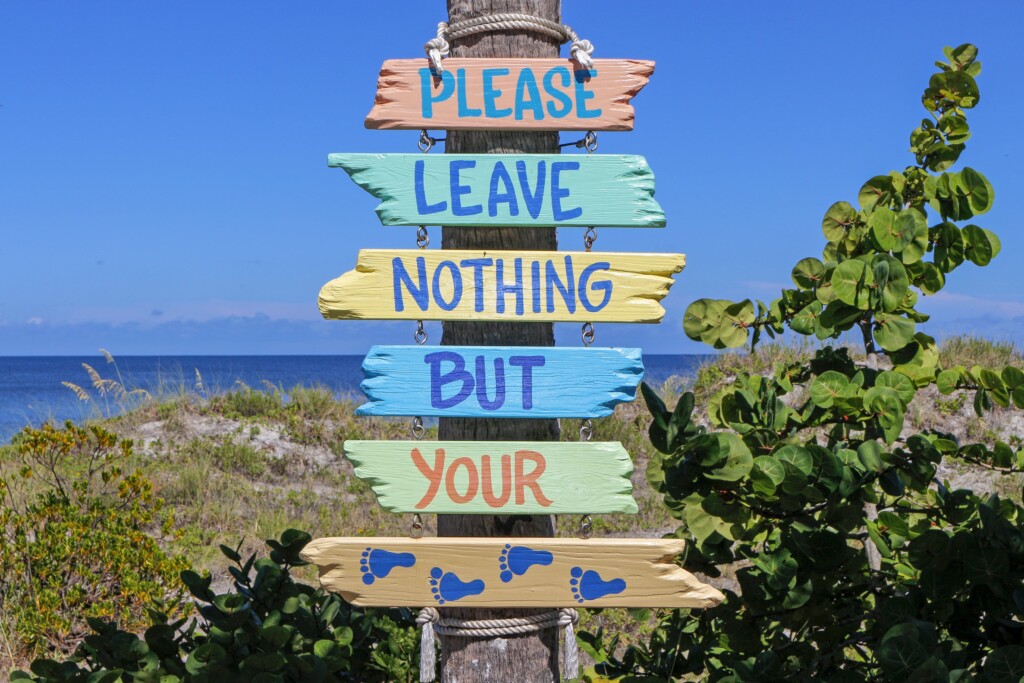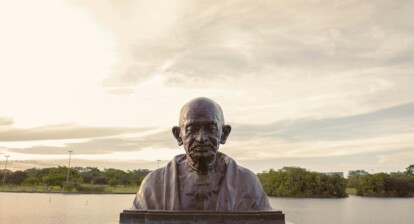The gradual increase of the tourism industry over the last two decades (see figure 1) has come paired with the surfacing of anti-tourism attitudes. After the Covid-19 pandemic, these attitudes have flourished once more as local institutions and residents reconceptualize how to move forward after a period of reduced tourist travel.

Institutional actors have recently taken the lead in discouraging tourism. For example, the Amsterdam city council in the Netherlands launched the ‘Stay Away’ ad campaign, targeting young, British men who wish to visit the city to enjoy its famous nightlife, permitted cannabis use and red light district. The ads show up online when tourists search for terms such as ‘stag party Amsterdam’ and warn them of the fines for breaking the law [2]. Another way local institutions, such as the one in Venice, have attempted to curb overtourism is by charging entry fees for non-residents to popular tourist destinations [3].
Although institutions are important actors in discouraging tourism, action against tourism and the wider tourism industry is also taken by inhabitants of popular tourist destinations. Where traditionally, tourism studies have focused on the economic costs and benefits of tourism, a growing body of research is concerned with the social costs and benefits of tourism for local residents [4]. Nevertheless, research on the sustained collective efforts of local residents against tourism is lacking [5] and tourism studies would benefit from conceptualizing Anti-Tourism as a social movement.
Anti-Tourism as a social movement
Such instances of anti-tourist action cannot be classified as a social movement; collective action needs to adhere to certain characteristics. The definition of what makes a social movement differs slightly amongst scholars. Diani (1992) defines a social movement as “networks of informal interactions between a plurality of individuals, groups and/or organizations, engaged in political or cultural conflicts, on the basis of shared collective identities.”[5] Also often included in the employed definition is a conflictuous orientation to an opponent and reliance on a repertoire of collective action[7].
The Anti-Tourism movement relies on a strong collective identity amongst those who choose to take action. This collective identity consists of the culture shared between local residents and their shared grievances caused by the tourism industry. Shared experiences of public disturbances by tourists [2]], rising costs of living due to neighborhood takeovers of temporary rentals like Airbnb [8] and the loss or commodification of culture [9] are all used in the construction of an ‘us versus them’ narrative. This narrative pits local residents against both the tourists and the cooperations profiting off of the tourism industry.

Local residents are not the only actors engaged in the conflict. The Anti-Tourism movement mobilizes already existing activistic social structures. An example of this is the violent anti-tourist protests that swept through Barcelona, Spain in 2017, that were linked to left-wing nationalist activists [10]. Furthermore, local authorities can act as allies to local residents in their fight against overtourism.
The tactical repertoire employed by social movement participants differs depending on the context and tactics range from the conventional to the violent. On the violent side of the spectrum, we have the previously mentioned protests in Barcelona, where – in addition to more conventional protests – there were numerous reports of tourist vehicles, like busses, cars and rental bicycles, being vandalized [10]. More confrontational action has been taken in Mallorca, where protesters marched on a popular resort [11]. On the opposite end, we have ludic or cultural actions such as the gigantic rat traps with ice cream as bait installed by the street artist ‘TooLate’ (see figure 2) in areas frequently visited by ‘tourist pests’ in Nice, France [12].
The role of tourism studies
Opponents of the Anti-Tourism movement argue that local residents should be glad that their location is popular with tourists as their presence boosts the economy and provides jobs for those living in the area. The economic cost/benefit models that have dominated the field of Tourism Studies for years continue to fuel these arguments. However, these models hardly ever include the social costs and benefits of tourism, or the personal perspectives of local residents in areas densely populated by tourists.
Academics working on Tourism Studies have sought to rectify this but oftentimes fail to recognize the value of conceptualizing anti-tourist actions and attitudes as part of a broader anti-tourism movement. Collective anti-tourist action satisfies the characteristics of a social movement and its continuity shows that instances of anti-tourist action should not be treated as one-off events. Therefore, to provide a more nuanced perspective on the costs and benefits of tourism, academics working on tourism studies should conceptualize collective anti-tourist action as part of a broader anti-tourism movement.
Referenties
[1] Statista Research Department. (2023, October 11). Number of international tourist arrivals worldwide from 2005 to 2022, by region (in millions) [Infographic]. Statista.https://www.statista.com/statistics/186743/international-tourist-arrivals-worldwide-by-region-since-2010/
[2] Hughes, N. (2018) ‘Tourists go home’: anti-tourism industry protest in Barcelona. Social Movement Studies, 17(4), 471-477. https://doi.org/10.1080/14742837.2018.1468244
[3] Dean, G. (2023, September 6). Day trippers to Venice will have to pay a $5.50 tourist fee as the city tries to curb excessive tourism. Business Insider. https://www.insider.com/venice-tourism-fee-day-trippers-italy-travel-vacation- europe-residents-2023-9
[4] Qiu, R.T., Park, J., Li, S. & Song, H. (2020). Social costs of tourism during the COVID-19 pandemic. Annals of Tourism Research, 84, 102994. https://doi.org/10.1016/j.annals.2020.102994
[5] Jäggi, C.J. (2022). Anti-Tourism Movements. In: Tourism before, during and after Corona. Springer. https://doi.org/10.1007/978-3-658-39182-9_7
[6] Diani, M. (1992). The concept of social movement. The Sociological Review, 40(1), 1–25. https://doi.org/10.1111/j.1467-954X.1992.tb02943.x
[7] Kriesi, H. (2017) Social Movements. In D. Caramani (Ed.), Comparative politics (pp. 274- 288). Oxford University Press.
[8] Gurran, N., Zhang, Y. & Shrestha, P. (2020). ‘Pop-up’ tourism or ‘invasion’? Airbnb in coastal Australia. Annals of Tourism Research, 81, 102845. https://doi.org/10.1016/j.annals.2019.102845
[9] Moghaddam, A. H. (2018). Anti-tourism against the commodification of culture: Varf Chal (pour snow in pit)/Zan Shahi (Kingdom of Women) ceremonies in the North of Iran. In A. Hassan & A. Sharma (Eds.), Tourism Events in Asia (pp. 140-151). Routledge. https://doi.org/10.4324/9781351105743
[10] Hughes, N. (2018) ‘Tourists go home’: Anti-tourism industry protest in Barcelona. Social Movement Studies, 17(4), 471-477. https://doi.org/10.1080/14742837.2018.1468244
[11] Carter, H. (2023, August 18). Anti-tourism march in top Mallorca resort. Majorca Daily Bulletin. https://www.majorcadailybulletin.com/news/local/2023/08/18/116179/anti-tourism-march-top-mallorca-resort-alcudia.html British men. BBC News. https://www.bbc.com/news/world-europe-65107405
[12] Rodriguez, C. (2023, July 31). Tourists Go Home! Fed Up With Over-tourism, European Hotspots Impose Bans, Fines, Taxes. Forbes. https://www.forbes.com/sites/ceciliarodriguez/2023/07/31/tourists-go-home-fed-up- with-over-tourism-european-hotspots-impose-bans-fines-taxes-and-traps/








Small SEO Tool
Its like you read my mind You appear to know so much about this like you wrote the book in it or something I think that you can do with a few pics to drive the message home a little bit but instead of that this is excellent blog A fantastic read Ill certainly be back
Forest Goodwin
Ive read several just right stuff here Certainly price bookmarking for revisiting I wonder how a lot effort you place to create this kind of great informative website
Osborne MacGyver
Simple and efficient user interface.
Erica Peterson
I loved as much as you will receive carried out right here. The sketch is attractive, your authored material stylish. nonetheless, you command get got an impatience over that you wish be delivering the following. unwell unquestionably come more formerly again since exactly the same nearly a lot often inside case you shield this hike.
Neuro Brain Cost
Excellent blog here Also your website loads up very fast What web host are you using Can I get your affiliate link to your host I wish my web site loaded up as quickly as yours lol
Ellis Hahn
Your blog is a great source of information.
Elizabeth Steuber
Keep up the excellent work!
Zena Kertzmann
I always learn something new and valuable from your posts.